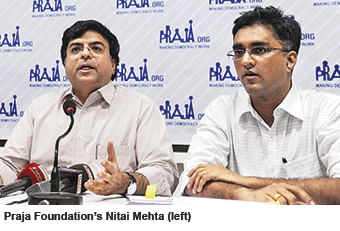Despite the municipal Corporation of Greater Mumbai (MCGM) being the richest local government institution countrywide (annual budget: Rs.33,514.15 crore), there’s steady flight of children from its 1,000 plus primary schools sprawled across expensive real estate in Mumbai.
According to a report Schools Run by the MCGM released on December 21 by the Mumbai-based non-government organisation Praja Foundation (estb.1997), the aggregate number of students in MCGM primaries declined by 7,000 in 2014-15. Data obtained by Praja under the Right to Information Act, 2005, indicates that the number of students in MCGM schools declined from 404,251 in 2013-14 to 397,085 last year.
MCGM owns and runs 1,252 primary schools in Greater Mumbai for children from low-income households, offering primary education in seven vernacular languages besides English. According to the Praja report, the flight from vernacular medium schools was 10.4 percent compared to 5.3 percent from its English primaries.
“At this rate, the day is not far when MCGM schools will have more teachers and employees than students,” says Nitai Mehta, managing trustee of the Praja Foundation. According to Mehta, 40,778 students have dropped out of MCGM schools during the past five years, even as the corporation’s education budget has doubled from Rs.1,761 crore in 2010-11 to Rs.2,630 crore in 2015-16. Annual per capita student expenditure in MCGM schools is Rs.59,744, the highest of all municipal governments countrywide, because of generous spending on free uniforms, books, lunch etc. Moreover this year, over 21,000 class VIII students were given electronic tablets free of charge.
 Nitin Wadhwani, founder-director of the Citizens Association for Child Rights, an NGO which is involved with MCGM’s education programmes, says that all is far from well with the corporation’s schools. “While the records indicate an excess number of teachers, in reality, most classes are without teachers because they are busy attending to administrative work or training programmes. Even MCGM’s English medium schools, in which enrolments are rising, are struggling with teacher shortages,” he says.
Nitin Wadhwani, founder-director of the Citizens Association for Child Rights, an NGO which is involved with MCGM’s education programmes, says that all is far from well with the corporation’s schools. “While the records indicate an excess number of teachers, in reality, most classes are without teachers because they are busy attending to administrative work or training programmes. Even MCGM’s English medium schools, in which enrolments are rising, are struggling with teacher shortages,” he says.
Typically, MCGM officials don’t accept that muddled syllabus formulation, ill-trained teachers reluctant to teach in English, and teacher absenteeism are prime causes behind the steady exodus of students from free-of-charge MCGM schools into fees-levying private, especially unrecognised private budget schools, which are mushrooming in Mumbai’s proliferating slums. Instead, they blame parents’ growing aversion to vernacular medium schools.
“Parents from even low-income households prefer private ‘convent’ to municipal schools and English medium education because of the aspirational values attached to them. This is reflected in the 14.77 percent annual increase in MCGM’s English medium primary schools. But even so, most city-based parents want to get their children into private English-medium schools under the 25 percent quota reserved in private schools by the Right of Children to Free & Compulsory Education Act, 2009. For similar reasons children are dropping out of municipal schools in Nagpur and Pune as well,” says Dr. J. Keluskar, deputy education officer of MCGM’s education department.
Yet at bottom, informed educationists and academics in Mumbai ascribe the rising unpopularity of MCGM’s schools to the failure of their principals and teachers to improve learning outcomes, and political indifference. According to the Praja Foundation report, none of MCGM’s 166 councillors addressed a question to education department officials during 2014-15. Neither have any of the five members of the corporation’s education committee raised a single education issue on the floor of MCGM.
With the Shiv Sena, a thuggish political party notorious for its linguistic parochialism and regressive hindutva ideology, having been in control of MCGM for the past 15 years, and re-elected in February 2012, it’s hardly surprising that teaching-learning standards in the corporation’s primaries have plunged. And with its ideological ally the BJP sweeping to power in the Maharashtra legislative assembly in October 2014, the flight out of government schools in India’s most industrial state is unlikely to abate.
Dipta Joshi (Mumbai)